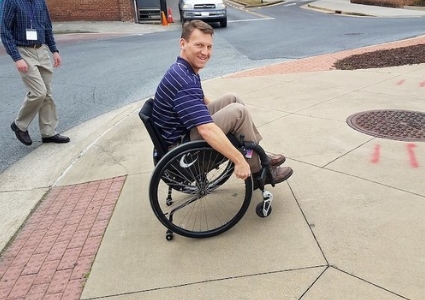Trustee Elections
These are the original issues in this subcategory
- WORKERS WITH DISABILITIES
- REHABILITATION
- AMERICANS WITH DISABILITIES ACT
The 1990 Americans with Disability Act (ADA) is a broad civil rights law that prohibits discrimination based on one’s disability. It provides protections against discrimination for Americans with disabilities in much the same way as the 1964 Civil Rights Act prohibited discrimination against race, religion, natural origin and gender. A disability is defined as a physical or mental impairment that substantially limits at least one major life activity. These activities include seeing, walking, sitting, lifting, breathing, learning, working and many more. It is estimated that 20% of all Americans have at least one diagnosed physical or psychological disability, and there are more than 40 million Americans who are disabled today.
One of the main reasons for the ADA is to insure access and accommodations for Americans with disabilities in places of work. Advocates say removing the barriers to employment, transportation, public accommodations and services enable people who are disabled to better contribute to society, benefiting us all. Most of the opposition to the ADA comes from businesses, churches and other public places that require physical modification of their facilities. ADA critics say we’ve gone overboard on some of these regulations. They claim unscrupulous attorneys often file lawsuits against property owners before giving them an opportunity to respond or correct problems related to limited access to their facilities.
Pending Legislation: H.R.241 - ADA Compliance for Customer Entry to Stores and Services Act or the ACCESS Act
Sponsor: Rep. Ken Calvert (CA)
Status: House Committee on the Judiciary
Chair: Rep. Jim Jordan (OH)
One of the main reasons for the ADA is to insure access and accommodations for Americans with disabilities in places of work. Advocates say removing the barriers to employment, transportation, public accommodations and services enable people who are disabled to better contribute to society, benefiting us all. Most of the opposition to the ADA comes from businesses, churches and other public places that require physical modification of their facilities. ADA critics say we’ve gone overboard on some of these regulations. They claim unscrupulous attorneys often file lawsuits against property owners before giving them an opportunity to respond or correct problems related to limited access to their facilities.
Pending Legislation: H.R.241 - ADA Compliance for Customer Entry to Stores and Services Act or the ACCESS Act
Sponsor: Rep. Ken Calvert (CA)
Status: House Committee on the Judiciary
Chair: Rep. Jim Jordan (OH)

- I oppose reforming current Americans with Disabilities Act policy and wish to donate resources to the campaign committee of Speaker Mike Johnson (LA).
- I support establishing certain procedural requirements in relation to complaints under the ADA regarding access to public businesses such as stores, restaurants, and hotels. And also requiring educational outreach and studies by federal agencies to promote ADA compliance by:
1.) Establishing a notice and cure period before a claimant may file a civil action against a public accommodation for failing to remove a barrier to access. Claimants must first provide the owner or operator of the public accommodation with a written notice specific enough to identify the barrier and the circumstances under which access was denied. An owner or operator then has 60 days to respond with a description of forthcoming changes and another 60 days after providing the description to make the changes, or show substantial progress in making the changes, before the claimant may proceed with a civil action.
2.) The bill also requires (a) the Department of Justice (DOJ) to develop a program to educate state and local governments and property owners on strategies to promote ADA compliance, (b) the Judicial Conference of the United States to develop a model program to promote alternative dispute resolution to resolve claims, and (c) the DOJ to study whether certain web content accessibility standards and telephone services provide reasonable accommodations under the ADA.
And wish to donate resources to the campaign committee of Rep. Jim Jordan (OH) and/or to an advocate group currently working with this issue.
- I support establishing certain procedural requirements in relation to complaints under the ADA regarding access to public businesses such as stores, restaurants, and hotels. And also requiring educational outreach and studies by federal agencies to promote ADA compliance by:
1.) Establishing a notice and cure period before a claimant may file a civil action against a public accommodation for failing to remove a barrier to access. Claimants must first provide the owner or operator of the public accommodation with a written notice specific enough to identify the barrier and the circumstances under which access was denied. An owner or operator then has 60 days to respond with a description of forthcoming changes and another 60 days after providing the description to make the changes, or show substantial progress in making the changes, before the claimant may proceed with a civil action.
2.) The bill also requires (a) the Department of Justice (DOJ) to develop a program to educate state and local governments and property owners on strategies to promote ADA compliance, (b) the Judicial Conference of the United States to develop a model program to promote alternative dispute resolution to resolve claims, and (c) the DOJ to study whether certain web content accessibility standards and telephone services provide reasonable accommodations under the ADA.
And wish to donate resources to the campaign committee of Rep. Jim Jordan (OH) and/or to an advocate group currently working with this issue.
There has been $0.00 pledged in support of this issue
Trustee Election - Opening Date
December 30, 2024
Trustee Election - Closing Date
January 6, 2025